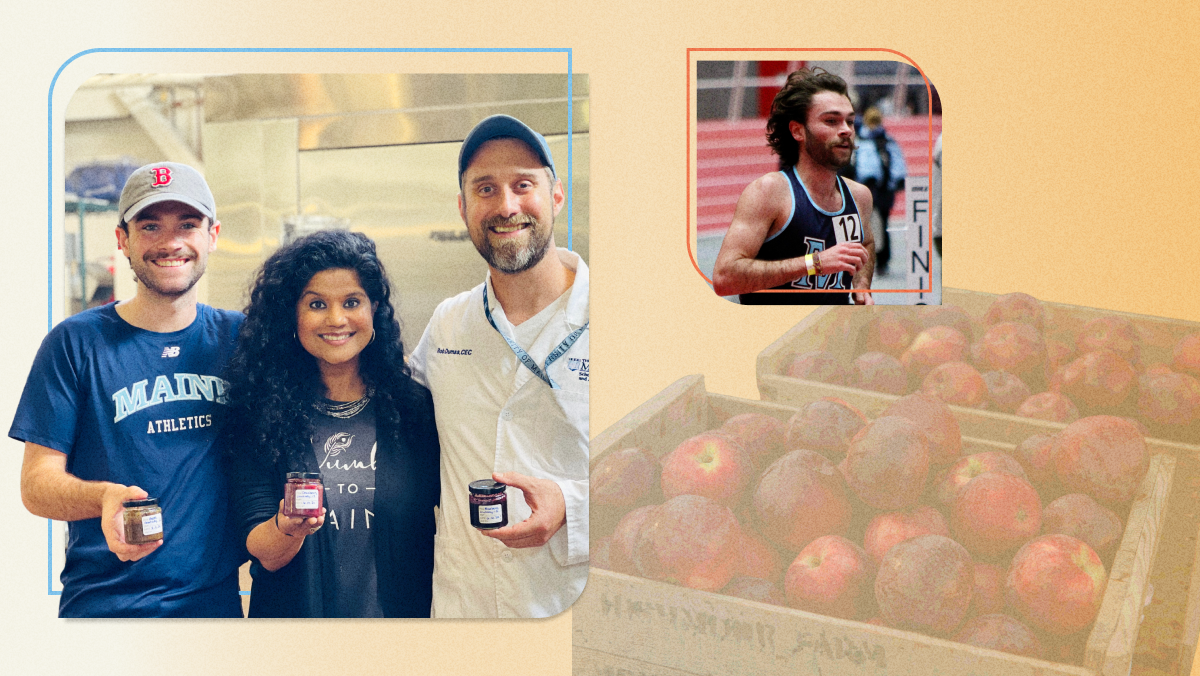
Fisher Macklin: Going the distance in food innovation
As a runner, Fisher Macklin has always been interested in food and how it fuels his body as an athlete. During his time at the University of Maine, that interest has grown into a major area of study and a unique on-campus job at the Dr. Matthew Highlands Food Pilot Plant.
When Fisher arrived at UMaine as a first-year from Connecticut, he joined the men’s cross country team, building strong friendships with many of his teammates and easing his transition to college. More recently, these friends have become a real asset for Fisher’s food science job — as willing tasters of new food products in the endlessly iterative testing process.
“Fisher is a unique hire for us because he didn’t come from the food science program,” said Rob Dumas, food science innovation coordinator and facility manager for the School of Food and Agriculture. “It’s a good reminder for me that food speaks to people across all different disciplines. Not only that, but lessons learned in the plant around soft skills like confidence and attention to detail can be transferred to many career paths.”
Fisher started his college career with an initial plan to major in computer science or kinesiology, but his passion for food and cooking stoked his interest in a job at the food pilot plant and soon convinced him to pursue a bachelor’s degree in food science and nutrition.
Fisher admits he really didn’t know what to expect when he began working at the plant. He’d always loved cooking and had some experience working in restaurant kitchens. He had a passion for nutrition, but none of that prepared him for a job that focused much more on food science and the business of bringing a new product to market.
“The projects taken on by the staff at the plant were real eye openers for me,” said Fisher. “I have a much better understanding now about how some of Maine’s small businesses take an idea and turn it into a product. I’ve learned a lot about what clients need and what factors go into decision-making.”
One of the first projects Fisher worked on was for Skowhegan-based Maine Grains, a company that grinds Maine-grown grains into flour and other products. The company was looking for a high value product that could be made from midlings, a low value byproduct from the milling process, and contracted with UMaine to help them develop and test ideas.
Fisher helped the team develop dry mixes like cookies, pancakes, muffins and quick breads that could be made with the midlings. He weighed out ingredients and made changes based on how the product tasted, looked and smelled — relying on his house mates for useful feedback.
“This hands-on work reinforces what Fisher is learning in other classes, like how to use a sensory approach to evaluate a product or how to think critically about the impact changing one ingredient might have,” said Dumas.
For another project, Fisher worked with Boothbay-based Mumbai to Maine LLC, a home-based business that makes Indian chutneys, to achieve the right pH level and make it shelf stable. The owner provided base recipes and Fisher made adjustments to the ingredients, cooking time and temperature, working on perfecting the consistency as well as the pH level.
Fisher also collaborated with UMaine Extension’s Food Testing Services lab for the chutneys. Food science specialist Beth Calder, who works just upstairs of the Pilot Plant, showed Fisher how to use a pH meter and provided definitive direction on specific requirements for products to achieve shelf stability.
“I wish more people knew how much goes into bringing a new product to market,” said Fisher. “For some of these projects, we’ve gone through more than 60 iterations before we get a flavor or texture just right.”
This kind of research and development is expensive and often out of reach for small businesses just starting out. Through industry partnerships, UMaine has increasingly been able to offer these services in a cost-effective way. For example, Wyman’s, a Maine-based wild blueberry company, has provided an annual foundation gift to allow students like Fisher the opportunity to work in the food pilot plant. Over the last year, with funding from the Maine Solutions Hub, a program of the Maine Jobs & Recovery Plan (MJRP), UMaine has been able to cover up to $16,000 per project. MJRP is Gov. Janet Mills’ plan, approved by the 130th Maine Legislature, for investing the state’s share of COVID-19 pandemic relief funds provided by Congress. The University of Maine System secured $35M of these funds specifically for workforce development and innovation.
It’s a very successful collaboration, in which small businesses and other industry stakeholders can receive much-needed research and development support and UMaine students get real-world experience to complement their classroom learning.
For Fisher, there’s no doubt it’s been a meaningful experience. When asked if there is anyone in particular who made a difference in his time at UMaine, he answered “The entire nutrition program and all of the people in it, especially Rob and Eileen (Molloy), by sharing their own enthusiasm and how much they love this work. UMaine has changed me a lot. I’m a completely different person today than when I arrived as a freshman.”
Contact: Melissa Arndt, melissa.arndt@maine.edu
